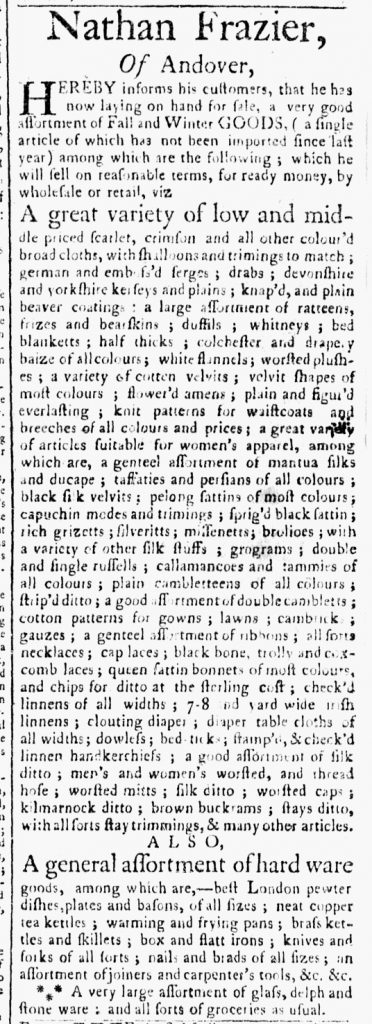What was advertised in a colonial American newspaper 250 years ago today?

“A single article of which has not been imported since last year.”
As summer turned to fall in 1769, Nathan Frazier of Andover placed an advertisement in the Essex Gazette to inform prospective customers that he stocked “a very good assortment of Fall and Winter GOODS” that he sold both wholesale and retail. Like many other merchants and shopkeepers, he provided an extensive list of his merchandise as a means of demonstrating the many choices available to consumers. This catalog consisted primarily of textiles and accessories (everything from “Devonshire and Yorkshire kerseys and plains” to “taffaties and Persians of all colours” to “a genteel assortment of ribbons”), but Frazier also carried a “very large assortment of glass, delph and stone ware” and a “general assortment of hard ware goods” imported from London. Such advertisements became a familiar part of the consumer revolution in the middle of the eighteenth century.
Most such advertisements, however, emphasized that imported goods had only just arrived in the colonies, that they were fresh from London and other English ports. Merchants and shopkeepers usually promoted only the newest merchandise, tacitly assuring prospective customers the latest fashions rather than leftovers that consumers previously refused to purchase. Frazier did not adopt that approach in his advertisement, and with good reason. He framed his list of goods with assurances that “a single article of which has not been imported since last year,” which meant that his entire inventory had been in his possession for at least nine months and perhaps even longer. These were not the newest goods presented to customers as soon as they became available, but making that appeal was not politically viable in the fall of 1769. Colonists in Boston and other towns in Massachusetts adopted nonimportation agreements that commenced on January 1, 1769. They deployed this form of economic resistance to protest an imbalance of trade with Britain and, especially, the taxes on certain imported goods that Parliament imposed in the Townshend Acts. Boycotting goods imported from Britain previously contributed to repealing the Stamp Act. Colonists hoped a new round of nonimportation agreements would have a similar effect with the Townshend Acts.
Nonimportation may have been an opportunity rather than a sacrifice for Frazier and other merchants and shopkeepers. Imported goods glutted the American market. Frazier’s lengthy list of merchandise suggests he had surplus goods that he had not managed to sell for the better part of a year. Adhering to the nonimportation agreement made a virtue of selling goods that lingered on shelves and in storerooms for some time, goods that consumers might otherwise not have even considered purchasing. The politics of the periods sometimes provided convenient cover for merchants and shopkeepers to rid themselves of goods they had difficulty selling in a crowded marketplace.

[…] Nathan Frazier’s advertisement for “a very good assortment of Fall and Winter GOODS” ran once again in the October 3, 1769, edition of the Essex Gazette. The shopkeeper promoted those goods by proclaiming “a single article of which has not been imported since last year.” In other words, his merchandise arrived in the colonies prior to the nonimportation agreement going into effect. He had not violated the agreement; prospective customers who supported the American cause could purchase from him with clear conscience. A new advertisement appeared immediately above it: “To be SOLD, A Likely Negro LAD, about eighteen or nineteen Years of Age, works well at the Cooper’s Trade, and understands working in the Field or Garden.” This produced a striking juxtaposition for readers, moving from an advertisement that contributed to the perpetuation of slavery to one that implicitly asserted the rights of Anglo-American colonists and defended their liberty against encroachments by Parliament. In the era of the imperial crisis that culminated with the American Revolution, colonists unevenly applied demands for liberty. […]
[…] agreements were in effect in the late 1760s and early 1770s. On September 26, 1769, he placed an advertisement in the Essex Gazette to inform prospective customers that he sold “a very good assortment of Fall and Winter GOODS, (a […]